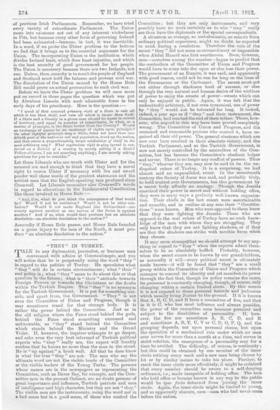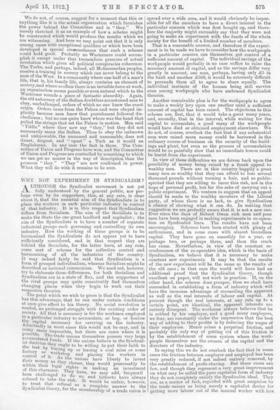" THEY" IN TURKEY. T ALK to any diplomatist, journalist, or
business man conversant with affairs at Constantinople, and you will notice that he is perpetually using the word " they " in regard to the politics of Turkey. He speculates what " they " will do in certain circumstances ; what " their " real policy is ; what " they " moan to do about this or that question in the future ; what is " their " attitude towards Foreign Powers or towards the Christians or the Arabs within the Turkish Empire. This " they " is no synonym for the Turkish Government. It is put for something out- side, and apart from, the Government. " They " is not even the Committee of Union and Progress, though it may sometimes stand for that strange body. It is rather the power behind the Committee. Just as in the old religion where the Fates stood behind the gods, behind the Fates stood something unnamed and unknowable, so "they" stand behind the Committee which stands behind the Ministry and the Grand Vizier. If, however, the inquirer attempts to go deeper, and asks even the very best informed of Turkish political experts who " they " really are, the expert will frankly confess that he knows no more than the man in the street. He is " up against " a brick wall. All that be does know is what the true " they " are not. The men who say the ultimate word are not the visible heads of the Committee or the visible leaders of the Young Turks. The persons whose names are in the newspapers as representing the Committee, such as Enver Bey, for example, and the Com- mittee men in the present Cabinet, are no doubt persons of great importance and influence, Turkish patriots and men of intelligence and high character, but they are not " they." The visible men are the instruments, using the word not in a bad sense but in a good sense, of those who control the Committee ; but they are only instruments, and very possibly have no more certainty as to who " they " really aro than have the diplomats or the special correspondents. A situation so strange, so melodramatic, so remote from ordinary political experience, might no doubt be expected to exist during a revolution. Therefore the rule of the secret " they " did not seem so extraordinary or impossible when Abdul Hamid was first overthrown. Soon, however, men—ourselves among the number—began to predict that the controllers of the Committee of Union and Progress would have to come into the open or else lose their power. The government of an Empire, it was said, and apparently with good reason, could not be run for long on the lines of the Freemasons or the Carbonari. The secret must get out either through slackness bred of success, or else through the very natural and human desire of the wielders of power to enjoy the sweets of power—sweets which can only be enjoyed in public. Again, it was felt that the undoubtedly arbitrary, if not oven tyrannical, use of power by " they ' would not be tolerated for long. It looked, indeed, a year ago as if " they " and their instrument., the Committee, had reached the end of their tether. Those, how- ever, who argued in this way have been proved completely wrong. The Committee of Union and Progress, and the unnamed and unnamable persons who control it, have re- gained all their old power. The general elections which are now over have resulted in their absolute victory, and the Turkish Parliament, and so the Turkish Government, is now not merely controlled by the controllers of the Com- mittee, but has become the Committee's obedient helper and server. There is no longer any conflict of powers. Thus " they," whoever they are, may now be said to be the un- disputed rulers of Turkey. It is a surprising, we had almost said an unparalleled, event. In the seventeenth century the Society of Jesus was said, and probably truly, to hold control over Governments, but this government by a secret body affords no analogy. Though the Jesuits exercised their power in secret and without holding office, they were in many ways a perfectly well-known organiza- tion. Their chiefs in the last resort were ascertainable and namable, and in outline at any rate their " Constitu- tions " were known. Mon who were opposed to them knew that they were fighting the Jesuits. Those who are opposed to the real rulers of Turkey have no such know- ledge of the men with whom they are struggling. They only know that they are not fighting shadows, or if they are that the shadows can strike with terrible force when they choose.
It may seem strangeltbat we should attempt to say any- thing in regard to " they " when the experts admit them- selves to be so absolutely baffled. Probably, however, when the secret comes to be known by our grandchildren, as assuredly it will—every political secret is ultimately made known—it will be found that "they" are a small group within the Committee of Union and Progress which manages to conceal its identity and yet manifest its power through the fact that, though its policy remains the same, its personnel is constantly chaugiug, though, of course, only changing within a certain limited circle. By this means it is not exposed to those personal hatreds and jealousies which usually bring Juntas to the ground. If it is known that A, B, C, D, and E form a committee of five, and that in it is 0, who has most influence and always presides, the power of the committee soon becomes personal and subject to the disabilities of personality. If, how- ever, the five are sometimes A, B, C, D, and E and sometimes A, B, T, U, V or C, D, 0, P, Q, and the grouping depends, not upon personal choice, but upon tire operation of a mechanical rule under which no man ever serves for more than a month at a time, and serves in strict rotation, the emergence of a personality may for a time be avoided. The difficulty, of course, is continuity ; but this could be obtained by one member of the inner circle retiring every week and a new man being chosen by lot or by similar means to take his place. Further, to mask the inner circle more effectively, it might be ordained that every member should be sworn to a self-denying ordinance, i.e., made incapable of holding office. The men who hold office or became known in any way to the public would be ipso facto debarred from joining the inner circle. Again, the inner circle might be limited to young, and so apparently obscure, inen—men who had never come before the nation. We do not, of course, suggest for a moment that this or anything like it is the actual organization which furnishes the power behind the Committee and is " they." We merely sketched it as an example of how a scheme might be constructed which would produce the results which we are witnessing. And here we may point out that it is only among races with exceptional qualities or which have been developed in special circumstances that such a scheme could developed good. Probably no Westerners could accom- plish it except under that tremendous pressure of actual revolution which gives all political conspiracies coherence. The Turks, and perhaps, indeed, all Mohammedan peoples, receive a training in secrecy which can never belong to the men of the West. In a community where one-half of a man's life, that is, his family life, always contains an element of secrecy, and where so often there is an invisible force at work, an organization seemspossible or even natural which to the Westerner sounds a piece of fantastic absurdity. Again, the old autocracy of the Sultan doubtless accustomed men to obey, unchallenged, orders of which no one knew the exact origin. Orders came from the Palace and were obeyed im- plicitly because men knew that punishment followed dis- obedience ; but no one quite laiew whose was the hand that pulled the strings that set the Palace in motion. Men said "Yildiz" where they now say " they," but they did not necessarily mean the Sultan. Thus to obey the unknown and unknowable, the unnamed and unnamable, does not daunt, disgust, and " upset " a Turk as it would an Englishman. In any case the fact is there. The Com- mittee of Union and Progress have won, and the Committee of Union and Progress are controlled by something to which we can get no nearer in the way of description than the pronoun " they." " They " are now confirmed in power. What they will do with it remains to be seen.







































 Previous page
Previous page